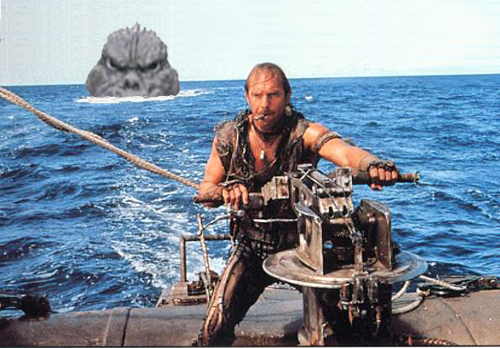
Movie still from <em>Field of Dreams</em>. Front page image: movie still from <em>Waterworld</em>.
Kevin Costner is definitely not an oil spill expert. Flanked by four seasoned marine scientists with doctoral degrees in the subject, he was the least likely member of a panel testifying to a House subcommittee about oil spill clean ups on Wednesday. He acknowledged as much in opening remarks. “There’s been some question as to why I’m here,” he said. “It’s not because I heard a voice in a cornfield.”
But over three hours of hearings Wednesday, Costner became the unlikely voice expressing the heart of an issue that has become very clear in the past 7 weeks. Neither oil companies nor the government were adequately prepared for a major oil spill. In fact, no one really believed that one would ever happen, and for years under-invested in and under-planned response technology.
Costner seems to have developed somewhat of an obsession with oil spill clean up. He got interested in the subject in 1995, and although he says he was inspired by the Exxon Valdez spill, some have pointed out that the interest also arose right around the time he released the post-apocalypse epic Waterworld. Since then, he’s spent $24 million funding Ocean Therapy Solutions, a company that has created a centrifuge device that separates oil from water.
“I have spent all my profits on oil spill clean up,” Costner told the panel. The amount of money he has personally spent becomes even more significant when you consider that an official from the Minerals Management Service told the panel yesterday that it only receives between $6 million and $7 million in government funding for the research and development of oil spill clean-up technology every year.
For more than a decade now, he’s presented the contraption to oil companies and government agencies, but his enthusiasm was “met with apathy,” he said. “I was told it was too expensive, that spills were becoming less frequent.”
The contraption is best described as a portable, vacuum-like metal unit that spins the oil out of the water. They have five different models, the largest of which can separate 210,000 gallons of water and oil per day. The company says it leaves the water 99 percent clean. BP has run several tests on the technology since the leak began, and approved it for use last month. Since then, BP has placed an order for 32 machines, the company reports, and ten machines are already out working in the Gulf. Ocean Therapy Solutions CEO John W. Houghtaling said he believes that when all these are in use, they will be able to clean 6 million gallons of water per day. (It’s not clear how much of a dent this could put in the spill, the total volume of which has not been determined. And since much of the oil has been dispersed into the Gulf using chemicals, it may be harder to do much with Costner’s contraption). The company envisions hundreds of these mobile units deployed around the world, ready for the next spill wherever it may occur.
Like many, I at first thought the idea of Kevin Costner as Gulf savior sounded absurd. But unlike BP or the federal government, he’s actually been thinking about this issue for the past 15 years. Meanwhile, the government’s response plans have remained essentially unchanged in the two decades since our last big oil spill. The two panels of independent scientists and government officials more than made that clear on Wednesday.
Costner, at least, may finally see his work validated after all these years: “If we’re going to continue to see oil coming up on shore and the best we can do is hay and rubber boots,” he told the committee, “maybe we can do better.”














